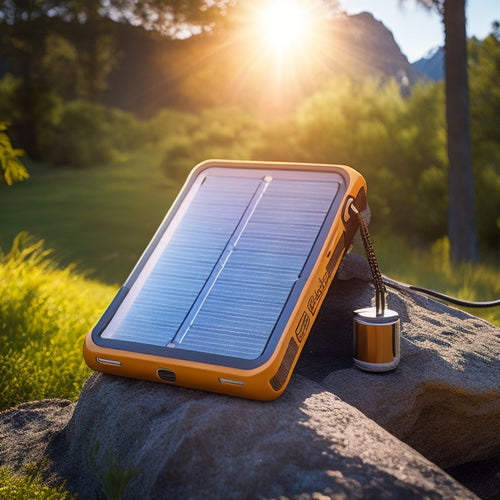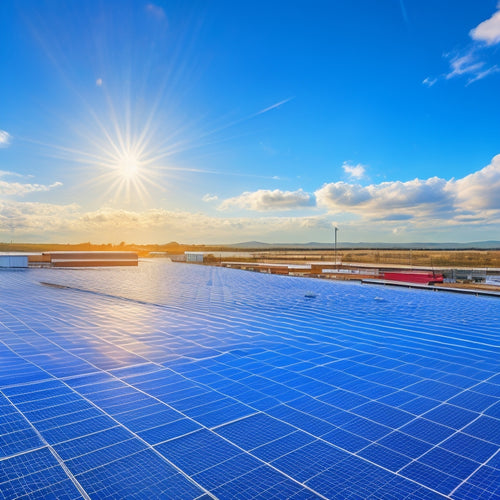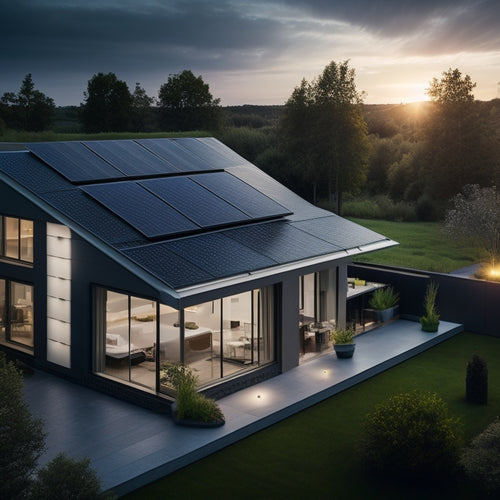
7 Essential Tips for Choosing Home Energy Kits Online
Share
When selecting a home energy kit online, you'll want to evaluate your daily energy consumption and identify energy-hungry appliances to determine your total daily energy needs. Next, confirm system compatibility, and assess battery type, size, and maintenance requirements. Choose durable solar panels, and verify certification and warranty coverage. Compare prices, value-added features, and reviews to make an informed decision. Don't forget to seek unbiased insights and ask the right questions. By following these essential tips, you'll be well on your way to finding the perfect home energy kit for your needs, and there's more to explore to ensure a seamless purchase experience.
Key Takeaways
• Assess your daily energy needs by calculating consumption, conducting an energy audit, and identifying energy-hungry appliances.
• Verify system compatibility, confirm device power requirements, and calculate total wattage to ensure seamless integration.
• Choose the right battery type, size, and maintenance requirements based on energy density, performance needs, and cost considerations.
• Select durable solar panels with high efficiency, anodized aluminum frames, and tempered glass, ensuring high IP ratings and UV resistance.
• Research and compare prices, certifications, warranties, and customer reviews to make an informed decision, seeking unbiased insights from experts and users.
Assess Your Energy Needs First
Before selecting a home energy kit online, determine how much energy you need to generate by calculating your daily energy consumption in watt-hours (Wh) or kilowatt-hours (kWh). This important step will help you choose the right kit for your needs.
To calculate your energy consumption, you can conduct a simple energy audit or hire a professional to perform a thorough home inspection. During the audit, identify the energy-hungry appliances and devices in your home, such as refrigerators, air conditioners, and lighting systems. Take note of their wattage ratings and the number of hours they operate daily.
Multiply the wattage by the number of hours used to get the total daily energy consumption in Wh or kWh. For instance, if your refrigerator consumes 200 watts and operates for 12 hours, its daily energy consumption would be 2.4 kWh (200 watts x 12 hours).
Check System Compatibility Issues
When selecting a home energy kit online, you'll need to verify system compatibility issues to guarantee a seamless installation.
You'll want to confirm that the kit's components can work together efficiently, and that's where checking device power requirements, system configuration, and inverter compatibility come into play.
Device Power Requirements
You'll need to determine the power requirements of your devices to make sure the home energy kit you choose can handle the load. This is important to guarantee that your energy kit can efficiently power your devices without compromising on energy efficiency. To do this, you'll need to calculate the total power consumption of your devices. This includes devices like lights, computers, TVs, and refrigerators.
Here are some key considerations to keep in mind:
-
Calculate the total wattage: Add up the wattage of all your devices to determine the total power requirement.
-
Consider the peak power consumption: Identify the devices that consume the most power and factor that into your calculations.
-
Check the power factor: Ensure that the energy kit can handle the power factor of your devices, which affects energy efficiency.
-
Think about energy storage: If you plan to store excess energy, consider the power requirements of your storage system.
-
Consult the manufacturer's guidelines: Check the manufacturer's recommendations for the maximum power load of your chosen energy kit.
System Configuration Checks
Configuring your home energy kit correctly involves checking for system compatibility issues to guarantee seamless integration of all components. You want to make sure that your system design is optimized for maximum efficiency, and that's where a thorough energy audit comes in.
This audit will help identify potential bottlenecks and areas for improvement, allowing you to make informed decisions about your energy kit configuration.
When checking for system compatibility issues, you'll want to take into account factors such as voltage, current, and power output. You'll also need to confirm that your energy kit's system design is compatible with your home's electrical infrastructure.
This might involve assessing the compatibility of your energy kit's inverter with your home's electrical panel, as well as ensuring that your system can handle peak power demands.
Inverter Compatibility Tests
To guarantee that your home energy kit operates efficiently, you need to perform inverter compatibility tests to identify potential system integration issues. This important step ensures that your inverter, which converts DC power to AC, works seamlessly with the rest of your system. Inverter compatibility tests verify that your inverter meets inverter standards and can handle the electrical output of your solar panels or wind turbines.
Here are key aspects to focus on during inverter compatibility tests:
-
Verify inverter standards: Confirm your inverter meets industry standards, such as UL 1741, to guarantee safe and efficient operation.
-
Conduct testing protocols: Perform tests like the 'island test' to simulate grid outages and ensure your inverter can operate safely in standalone mode.
-
Check grid synchronization: Verify that your inverter can synchronize with the grid frequency and voltage to prevent damage or tripping.
-
Evaluate maximum power point tracking (MPPT): Test the inverter's ability to optimize energy harvest from your solar panels or wind turbines.
-
Monitor inverter performance: Verify that your inverter can operate within the specified temperature range and humidity levels.
Evaluate Battery Type and Size
When selecting a home energy kit, choosing the right battery type and size is essential, as it directly impacts the system's performance, efficiency, and overall cost. You'll want to take into account factors like energy density, which affects the battery's ability to store energy per unit of weight and volume. Higher energy density means more power in a smaller package.
You should also evaluate the battery type, such as lead-acid, lithium-ion, or nickel-cadmium. Each has its pros and cons, so it's important to understand your needs and preferences. For instance, lithium-ion batteries are known for their high energy density and low maintenance requirements, making them a popular choice. However, they can be more expensive. On the other hand, lead-acid batteries are more affordable but heavier and less efficient.
Proper battery maintenance is also crucial to extend the lifespan of your energy kit. Look for kits that offer easy maintenance features, such as monitoring systems and alerts for when maintenance is required.
Look for Durable Solar Panels Only
You'll want to prioritize solar panels built to withstand the elements and last for years to come, as high-quality panels will guarantee maximum energy harvesting and minimize maintenance costs.
When selecting solar panels, consider the following key factors to secure durability and efficiency:
-
Material selection: Look for panels made from high-efficiency materials, such as monocrystalline silicon, which provide better solar panel efficiency and longer lifetimes.
-
Frame durability: Choose panels with anodized aluminum frames that can withstand harsh weather conditions and corrosion.
-
Glass or protective coating: Opt for panels with tempered glass or a protective coating to shield the solar cells from environmental stressors.
-
Water resistance: Secure that the panels have a high IP (Ingress Protection) rating to prevent water ingress and damage.
-
UV resistance: Select panels with UV-resistant materials to prevent degradation from prolonged sun exposure.
Check for Certification and Warranty
Certification from recognized organizations and a thorough warranty are vital indicators of a home energy kit's quality and reliability. When shopping online, you should look for certifications like UL Certification, which guarantees the product meets safety and performance standards. This certification is essential, as it assures that the kit's components won't compromise your safety or the environment.
Additionally, a reputable manufacturer will offer a detailed warranty that covers defects and performance issues. Be sure to read the fine print and understand the warranty terms, including the duration, coverage, and process for filing warranty claims. A trustworthy manufacturer will have a transparent and hassle-free warranty process. Don't settle for anything less, as a good warranty can save you from costly repairs and replacements down the line.
Compare Prices and Value Added
Shopping around for the best deal on a home energy kit can save you money and guarantee you're getting the most bang for your buck, so it's essential to compare prices and value-added features from different manufacturers. When comparing prices, take into account your budget constraints and prioritize the features that matter most to you. Don't just focus on the initial cost; also think about the long-term savings and benefits.
Here are some key factors to keep in mind when comparing prices and value-added features:
-
Added features: Do you need advanced monitoring capabilities or smart home integration? Are there any additional components you need, such as energy storage or backup power systems?
-
Warranty and support: What kind of warranty and customer support does each manufacturer offer?
-
Certifications and compliance: Are the kits certified by reputable organizations, and do they meet local building codes and regulations?
-
Customer reviews and ratings: What do other customers say about their experiences with each manufacturer?
-
Upgrade and expansion options: Can you easily upgrade or expand your system in the future if your energy needs change?
Read Reviews and Ask Questions
When researching home energy kits online, it's crucial to read reviews from multiple sources to get a well-rounded understanding of a product's performance.
You'll want to ask the right questions to clarify any doubts you may have, ensuring you're making an informed decision.
Proven Product Performance
When researching home energy kits online, you'll want to scrutinize product reviews and ask pointed questions to make sure the system you choose has a track record of delivering on its promises. This is important in guaranteeing that your investment pays off in the long run.
To assess a product's performance, look for:
-
Reliability metrics: Check if the product has a proven track record of consistent energy generation and minimal downtime.
-
Industry benchmarks: Compare the product's performance to industry standards and benchmarks to make sure it meets expectations.
-
Real-world examples: Look for case studies or real-world examples of the product's performance in similar environments.
-
Third-party certifications: Check if the product has received certifications from reputable third-party organizations, such as UL or IEEE.
-
Warranty and support: Evaluate the manufacturer's warranty and support offerings in case you encounter any issues.
Ask the Right Questions
You've got to dig deeper than just product specs and marketing claims to truly understand a home energy kit's capabilities, so you'll need to read between the lines of reviews and ask pointed questions.
Online research is essential in getting a well-rounded view of the product. Look for reviews from multiple sources, including independent review websites and forums. Pay attention to the common praises and complaints, as they can indicate the kit's strengths and weaknesses.
As you read reviews, make a list of questions to ask the manufacturer or supplier. Don't be afraid to reach out to them directly, as they can provide valuable insights into the product's performance.
Consider consulting with experts in the field, such as energy auditors or solar panel installers, to get their opinions on the kit's capabilities. They can offer valuable advice on what to look for in a home energy kit and help you make an informed decision.
Get Unbiased Insights
To get a genuine understanding of a home energy kit's capabilities, it's essential to look beyond the marketing claims and explore unbiased reviews from multiple sources. You want to hear from people who've actually used the kit, not just the company's sales pitch. This is where expert opinions and independent reviews come in.
Here are some tips to help you get unbiased insights:
-
Check out review websites that specialize in home energy kits, such as EnergySage or SolarReviews.
-
Look for reviews from multiple sources, including forums, social media, and online marketplaces.
-
Pay attention to the overall rating and read the comments to get a sense of the kit's strengths and weaknesses.
-
Reach out to friends, family, or colleagues who've experience with home energy kits and ask for their honest opinion.
-
Don't be afraid to ask questions on online forums or social media groups dedicated to home energy kits.
Frequently Asked Questions
What Is the Ideal System Size for My Small Apartment?
To determine the ideal system size for your small apartment, you'll need to assess your energy needs, considering factors like apartment size, insulation, and energy-efficient appliances to guarantee a tailored solution.
Can I Install a Home Energy Kit Myself or Hire a Professional?
As you start on this energy-efficient journey, you'll face a pivotal fork in the road: can you navigate the installation solo, or should you enlist a pro's expertise? Weigh DIY incentives against safety concerns before making your move.
Are Energy Kits Compatible With All Roof Types and Angles?
When considering energy kits, you'll want to guarantee compatibility with your roof type and angle. Be aware that roof complexity and angle variations can impact installation, so it's important to choose a kit that adapts to your unique roof features.
How Long Does It Take to Receive and Install a Home Energy Kit?
As you await the arrival of your home energy kit, imagine a swift courier, like a wingspan of eagles, soaring towards your doorstep. You'll typically receive your kit within 3-7 business days, and installation takes around 1-3 days, contingent upon Shipping Delays and the complexity of your Installation Timeline.
Are Energy Kits Available for Rental Properties or Just Owned Homes?
You're wondering if energy kits are only for owned homes, but the good news is that they're also available for rental properties, with landlord incentives and flexible rental agreements that benefit both you and your landlord.
Related Posts
-

Fastest Solar Chargers for Emergency Power
When choosing the fastest solar chargers for emergency power, you need to focus on features like rapid charging capab...
-

Commercial Solar Energy
As you consider powering your business with commercial solar energy, you'll uncover it offers a triple benefit: signi...
-

Home Solar Battery
You're opting for a home solar battery that allows you to utilize the power of the sun during the day and use it at n...


